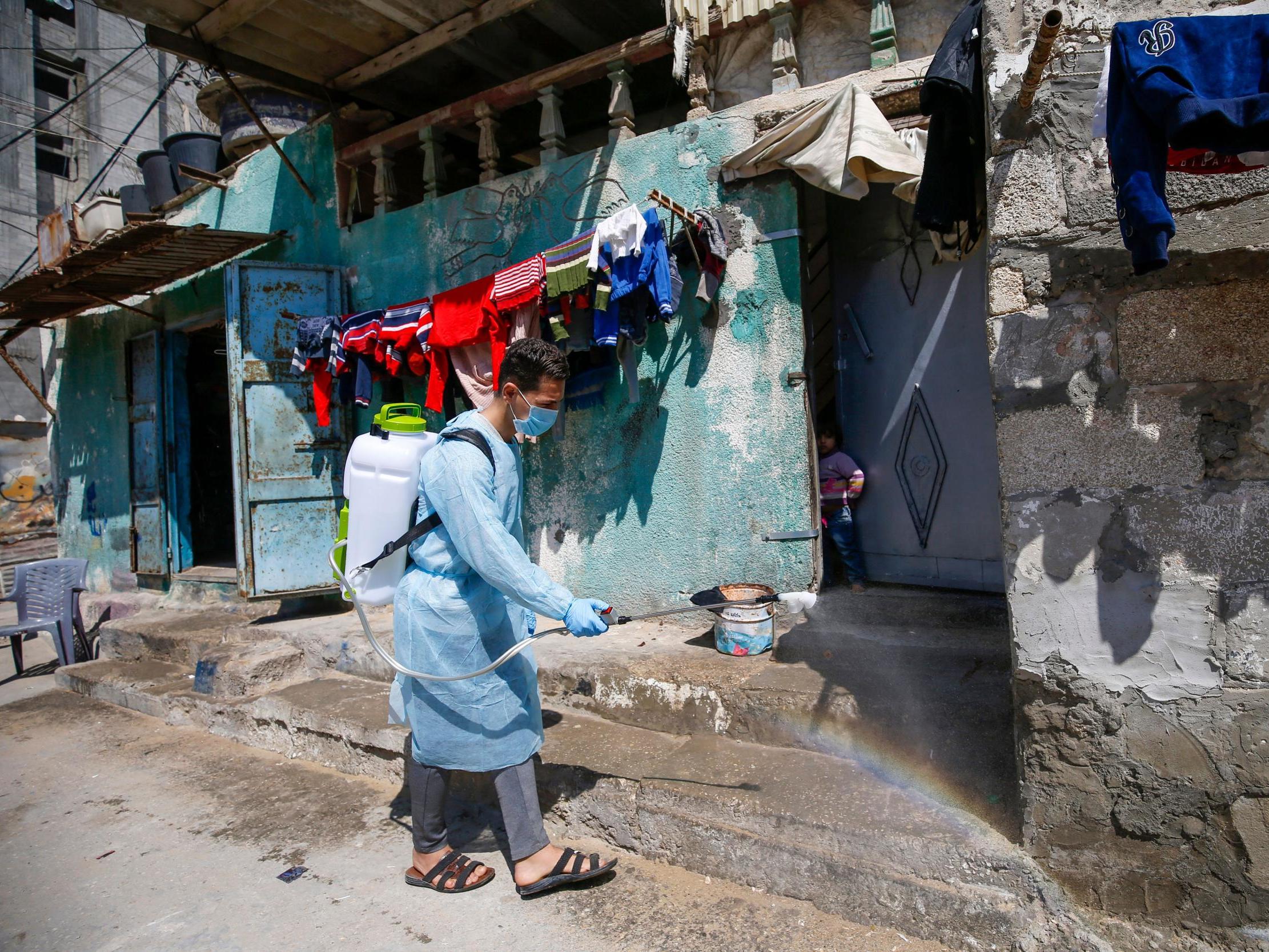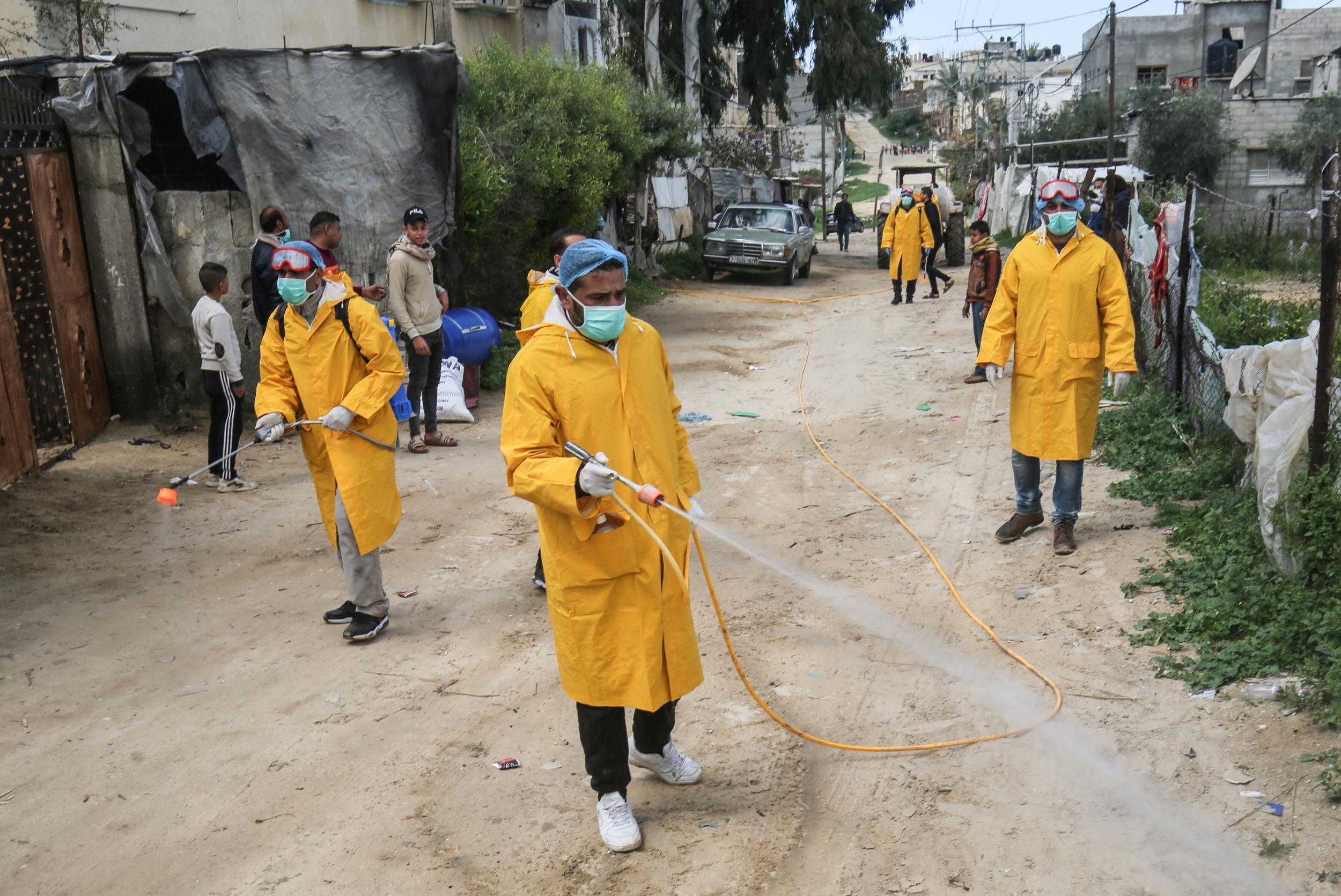Coronavirus arrives in Gaza – where there are only 8 ICU beds
Gaza lacks protective equipment for medics, testing kits and essential drugs – igniting fears the virus could spread unchecked, Bel Trew reports


The coronavirus has reached Gaza, igniting fears that a deadly epidemic could spread unchecked, as health officials warn they have only eight ICU beds and a week’s supply of medical masks, goggles and gloves.
Two men aged 63 and 79 returning from Pakistan via Egypt tested positive on Sunday and are being treated in insolation in a special facility beside the southern Rafah border.
An outbreak could wreak havoc in the 25-mile long strip which is home to over 2 million people, many living in cramped cities and refugee camps.
The health system has been crippled by a 13-year Israeli and Egyptian siege - Gaza’s health ministry said before the outbreak they already lacked over 40 per cent of the essential drug list.
Officials also fear that with 60 per cent of the essential supplies needed for medical diagnosis missing, and a very limited supply of Covid-19 testing kits, it will be impossible to detect new cases and fight the spread.
The World Health Organisation (WHO) said that since 15 March, over 1,200 people have been put in quarantine in Rafah. Schools have been designated as quarantine facilities while more than 2,071 people are in home quarantine.
Despite these measures, Dr Yousef Abu El-Reesh, a health ministry spokesperson, said Palestinian medics were bracing for the worst as isolation and early detection cannot be properly enforced.
“It is ‘either or’ here in Gaza: either we have no cases or we have the worst-case scenario which would be 2,000 infections in just a few days,” he told The Independent.
“Unfortunately we do not have the tests to do early detection, we lack laboratory equipment to check for complications and we lack nearly half of the essential drug list, a gap which will only widen.”
He said emergency staff working on non-coronavirus were already working without masks. They only have 500 packs of personal protection equipment (PPE), such as medical gowns, gloves, masks and goggles, but would need 20 times that amount if the coronavirus spreads.
“We have over 45 beds in intensive care wards but only eight are prepped to cope with Covid-19 patients,” he continued.
“We have direct contact with the WHO but urgently need more supplies now. So many people could die.”
Israel imposed a crippling blockade on Gaza after militant group Hamas violently swept control of the coastal enclave in 2007.

The Israeli military has also fought three wars with Gaza’s armed groups, devastating infrastructure.
Hamas has shuttered schools, public markets and event halls and advised Palestinians to pray at home to minimise the risk of coronavirus transmission.
Over the weekend, Gaza residents shared photos of volunteers disinfecting taxis, roads and buildings as well as distributing leaflets outlining health care advice.
Israeli authorities, which have sent 200 coronavirus testing kits to Gaza, said on Saturday they were closing borders with Gaza and the West Bank to commercial traffic, though some patients and humanitarian staff could cross.
The Palestinian health ministry listed 59 confirmed coronavirus cases in the West Bank, while Israel had 945 confirmed cases and one death.
Dr Gerald Rockenschaub, the WHO’s director for the occupied Palestinian Territory, who visited healthcare centres in Gaza over the weekend, delivered further testing kits but warned there was only “a small window” to bolster the crippled healthcare system.
The UN’s Palestinian refugee agency, meanwhile, told The Independent they were struggling to protect Gaza’s 1.4 million registered refugees from infection as they were in the throes of their worst ever financial crisis and were just two months away from completely running out of funding.
In Gaza, Unrwa feeds a million people a day, runs 22 health centres and over 270 schools.
However, the agency, which has been hampered by corruption allegations, was blindsided by a 2018 decision from its biggest donor the US to indefinitely slash funding.
“We will run out of money in May,” Tamara al-Rifae, Unrwa’s spokesperson, told The Independent, urgently appealing for new donations.
“This will impact our health services, our food distribution and will only compound the situation for those who are already vulnerable.”
Gaza’s isolation likely delayed the arrival of the coronavirus, which has infected more than 300,000 people worldwide and killed more than 13,000. More than 90,000 people have recovered.
Join our commenting forum
Join thought-provoking conversations, follow other Independent readers and see their replies
Comments